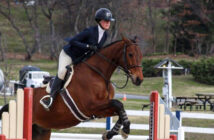
Centennial School, located 10 minutes from Lehigh’s Asa Packer Campus, is a private school staffed by Lehigh University faculty and graduate students. Centennial’s mission is to provide special education services for students with severe learning and emotional behavioral disabilities.(Lauryn Ragone/B&W Staff)
Julie Fogt locates her portrait under the “F” section in the Easton Area High School yearbook.
The typical high school question printed in bold black ink reads, “What do you want to be when you grow up?”
The words “child psychologist” are printed beneath her name.
“I must have always known this,” said Fogt, who earned her undergraduate degree in psychology. “I always wanted to work with children, and I liked the educational aspect.”
For the past 22 years since then, Fogt has made her morning commute to Centennial School, just a 15-minute drive from her alma mater. The private school is staffed by Lehigh faculty and graduate students. Centennial’s mission is to provide special education services for students with severe learning and emotional behavioral disabilities.
But this year, Fogt heads to Centennial as its new executive director.
While Fogt is only 30 school days into her new position with the students, her colleagues say she serves with poise and expertise.
Fogt began at Centennial as a school psychologist. She returned to the Lehigh Valley after finishing her education specialist master’s degree at James Madison University — a requirement for becoming a school psychologist — and then completing a year-long internship at Iowa State University.
While working at Centennial, she received her doctorate degree in educational leadership from Lehigh.
She held various positions within Centennial along the way, including elementary school coordinator, director of the partial hospitalization program and associate director. Her role as associate director served as a two-year “apprentice job” in preparation for executive director.
“I see all these as opportunities to prove that I have the skillset to lead the entire Centennial School (program),” Fogt said.
In her first days as the school psychologist, she paraded around with a large yellow notebook asking teachers about students who needed a functional behavior assessment — a technique used to outline students’ behavior and suggest strategies to improve their behavior.
Fogt arrived at the first classroom and listed five names.
She strolled over to the second classroom and listed seven names.
After visiting all the classrooms, Fogt said her entire sheet was filled with names of students needing assessments.
“I couldn’t get through (this list) in a year,” Fogt thought to herself.
Former Centennial director Michael George, who ran the school for 19 years, changed Fogt’s outlook on how to tackle this seemingly insurmountable task.
George provided positive behavior supports, which are rules reinforcing positive behaviors school-wide, class-wide and on the individual level.
Students are recognized for six behavioral expectations throughout the day, which include: “Be here, be ready, be responsible, be respectful, maintain personal space and follow directions.”
One by one, names started disappearing from the list. She now had a manageable list of students that needed assessments.
“Wow!” Fogt thought. “This is magic.”
The school-wide positive behavior support model worked.
Fogt said the model, which is still used today, is successful for students who don’t progress in typical classroom environments because of emotional disturbance, autism or multiple learning disabilities.
Fogt attributes her success to George’s expertise, positivity and mentorship.
Among George’s philosophies is eliminating the practice of physically restraining students. This practice has brought Centennial School into the educational spotlight as an accredited and respected special education school.
“Virtually everything I have learned is from Michael (George),” Fogt said. “He leads in a way that (shows) he is passionate about children, and he is passionate about not accepting excuses for why we can’t move forward.”
Fogt adopted George’s mantras for approaching misbehavior in the classroom. One of the philosophies she holds dear is that “being nice matters,” even in the most challenging situations.
When a student is angry, Fogt said positivity is the best approach.
If a student calls the teacher inappropriate names, the next day the teacher responds with kindness.
George said he believes Fogt shares the same goal for cultivating positivity and compassion in the classroom.
“She has outstanding leadership characteristics and qualities,” George said. “Through her kindness and gentle approach, people are eager to follow her directives. This certainly goes a long way in moving an organization in a positive direction. Kindness is her hallmark as a professional and as a person.”
George White, a professor of educational leadership and board member for Centennial School, also influenced Fogt as her professor and colleague.
He said that she has grown in her ability to manage — not just students, but also her staff.
“We are blessed she now assumed the role as executive director of Centennial School,” White said. “It’s now her show to run . . . Under George’s tutelage she has done a lot, and now she will take (Centennial) to the next level.”
In her new role, Fogt is responsible for Centennial’s daily operations, as well as managing teachers and finances. She said she acts as a “liaison” between Lehigh and Centennial School when adopting new modifications the Lehigh education program incorporates into Centennial.
Each day, she returns through the wooden doors “to make a difference.”
Fogt said the power of Centennial School is in celebrating the students’ successes. One way they celebrate success is through their honor roll breakfast, when they recognize the students’ academic achievements.
“Becoming an honor roll student is extremely difficult,” Fogt said. “These kids have a history of school failure. To see the joy in their eyes, and in families’ faces, is moving. Hearing that this is the happiest moment of their lives is really powerful.”
Days pass. Weeks pass. Months pass until the next honor roll celebration.
For Fogt, no two workdays are the same.





Comment policy
Comments posted to The Brown and White website are reviewed by a moderator before being approved. Incendiary speech or harassing language, including comments targeted at individuals, may be deemed unacceptable and not published. Spam and other soliciting will also be declined.
The Brown and White also reserves the right to not publish entirely anonymous comments.